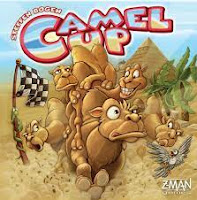Note: this review is for the first edition of the game (as seen on the cover image). I do not have experience with the second edition, so take the review as such.
With the world’s casinos regularly turning profits in the billions, it’s clear humanity has a thing with odds, risk and gambling. It’s no surprise that this form of fun is represented in boardgame form, also. In fact, I suppose there is a case to be made that the majority of boardgames hold the same principle: reward through risk. But I’ll save that for another day. In perhaps its most overt form, Camel Up! takes the concept of racetrack betting and stands it—not on its head, just up.
In Camel Up!, 2-8 players take on the role of camel speculators at the racetrack, trying to earn the most money. Five camels, each of a different color, race in front of the speculators, trying to be the first (and upon many an occasion topmost) to cross the finish line. A turn starts with the first player who decides whether to: hazard a bet which camel will be in first place at the end of the round, roll a dice from the dice pyramid, hazard a bet which camel will be first or last at the end of the race, or place one of their land tiles to either move a camel one space forward or one space backward if they happen to land on it going forward. That's it. Choice of four options. Their turn is finished, and the next player takes their turn. Play proceeds until all five dice have been rolled. Players collect their earnings, depending on the result of their actions and bets, and the next round begins. Rounds continue until one camel—or more—crosses the finish line, bets for first and last place are tallied, and total earnings are counted. This “or more” needs a closer look as it’s here that the game’s betting becomes diverse and interesting.
In Camel Up, camels can piggyback off one another. When one camel lands on the same space as another, instead of standing beside that camel, it goes on top—camel up. After, if the die of the camel on bottom is rolled, both camels move forward rather than just the bottom camel. Possible for all five camels to be standing atop one another, the calculation of odds becomes all the more diverse yet satisfying when looking at the board state on your turn. Like blackjack, the game triggers fun thought on odds and potential earnings.
We typically play games as a small family, which means we do not have many games that play more than four or five people. Camel Up plays eight, however, and we have played it with that many people at parties. It works extremely, extremely well—very exciting, rambunctious, and raucous with uncles, aunts, and cousins piping in. There are oohs and aahs, cycles of happiness and disappointment, and outright cheering for camels—just like you would see at the actual racetrack. In terms of a true family game, it’s difficult to ask for more player engagement than what I’ve seen with large groups from Camel Up. The excitement is real.Most games have complementary components, but in the case of Camel Up I would argue one of the components actually makes the game: the dice pyramid. An objective way to randomize which dice is rolled, the pyramid is a cardboard structure into which players load the dice at the beginning of the round. Pushing a lever on the side deposits one dice on the board—players leaning close to see which die as it directly affects odds and betting. In fact, when my children were younger they would choose to “roll the dice” just to have the satisfaction of pushing the lever.
In the end, Camel Up! is a game that was popular upon its release, and has generally retained its popularity since. And for good reason. It’s a very tight design. The board and pieces are colorful and inviting. The rules are simple and easy to learn. And everybody loves the dice pyramid—I assume the same as they love pulling the handle of a one-armed bandit, pokie, or whatever your culture calls a slot machine. Camel Up’s coins made of cardboard, however, there is no risk of flushing your fortune away in one sitting. The risk of having huge amounts of excitement and fun is significantly higher.



No comments:
Post a Comment